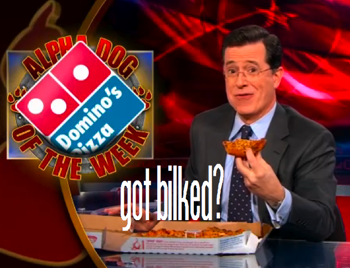 While browsing the Eating Liberally blog I stumbled across an article which not only initially interested me with the screenshot of Stephen Colbert, but continued to engage—and frustrate—me with statistics of negative government influence. How can hunger be so prevalent in a country whose government insists so greatly on overproduction of food? As the article says, "And all that waste has to go someplace, whether it's to the landfill, the compost heap (all too rarely), or our stomachs."
While browsing the Eating Liberally blog I stumbled across an article which not only initially interested me with the screenshot of Stephen Colbert, but continued to engage—and frustrate—me with statistics of negative government influence. How can hunger be so prevalent in a country whose government insists so greatly on overproduction of food? As the article says, "And all that waste has to go someplace, whether it's to the landfill, the compost heap (all too rarely), or our stomachs."Additionally, the article reminded me of King Corn, a documentary which, among other issues, raises that of the overproduction of corn and the results of that excess.
King Corn is available for instant play on Netflix, just an fyi.
Finally, here's an article on Sustainable Food Blogs if you're interested in reading further.
There is so much to talk about when it comes to economics, government and food (not that I'm an expert). The American economy is so based around profit that if it costs less and creates more profit to sell unhealthy and irresponsibly produced food, it's going to take a huge upheaval to change that trend. It's a big problem that organic and sustainable food is so much more expensive than its unsustainable alternative. Unless there's a radical shift in the way the government treats food or there's a huge push from Americans, I don't see any big shifts coming in the near future. It would be great to see some sort of initiative from the government that subsidizes sustainable food or taxes the unsustainable status quo, similar to energy efficiency legislation. Maybe there already is some.
ReplyDeleteThere's been talk of restricting food stamps' purchasing power, keeping them from being used on sodas or other sugary, unhealthy foods but I'm not aware of anything actually passing.
ReplyDeletehttp://danieljmitchell.wordpress.com/2010/10/07/should-food-stamps-be-restricted-to-healthy-foods/
You're opening a HUGE can of worms here, Alexis, and I'm glad. We'll delve more deeply into this with The Omnivore's Dilemma.
ReplyDeleteWhen the Domino's story broke, I was appalled but not surprised. Keeping Americans sick and fat is big business for a lot of high-powered players. One of the things I hope we can do in this class is talk about how to actively resist such injustices (a very complicated endeavor, indeed).
Great topic, Alexis--
ReplyDeleteI like the way that responsibility plays into all of this: who is responsible for what we eat? And, furthermore, is it an issue where it's reasonable for finger-pointing and blame to surface? -because it seems like such a thing of entitlement. It seems like it ought to be a right, but there's so much less control to be had by an individual than we sometimes think-?
In "Animal, Vegetable, Miracle" I really like the honest way that Kingsolver tries to "stick it to the man" of industry-- she jokes about being on the government's list of dangerous people because she publicizes these works that reveal (with meticulous detail and incredible research) how harmful, and even corrupt, the food industry is. The scariest thing is: it's without our even knowing so much of the time. (-thought that might have a place here...)
Even though I'm revisiting your blog post, and feel more knowledgeable and less shocked about the presence of the processed corn and fossil fuels in our food, I'm even more disgusted by it now.
ReplyDeleteIt reminds me of an article Alaina had on her blog, "Is 'Eat Real Food' Unthinkable?" by Mark Bittman. The U.S.D.A. supports not only Domino's Pizza, but a variety of other processed foods--because "in moderation" they aren't bad for you. Labels on prepackaged food products are now appearing to be more "healthy"because they are low in SOFAs (Solid Fats and Added Sugars). In reality, they are just as bad for you and probably even farther from food than they were before. Really, your best bet is to eat REAL food. The lack of transparency in the U.S.D.A. is really discouraging--and the fact that they can't simply tell the general public what is healthiest for them. No. According to the article, "the problem, as usual, is that the agency’s nutrition experts are at odds with its other mission: to promote our bounty in whatever form its processors make it." Like Colbert says in the clip, consumers are basically like human garbage cans. I guess the first step in changing this is educating others about what exactly is going into their bodies...